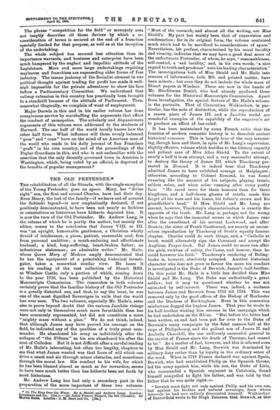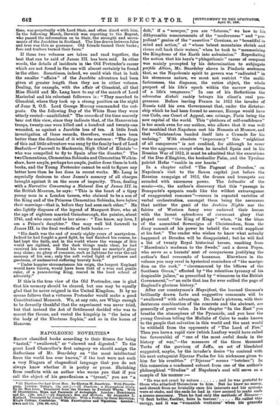THE OLD PRETENDER.*
THE rehabilitation of all the Stuarts, with the single exception of the Young Pretender, goes on apace. Mary, her " divine right" son, the first and second Charles, have had their day. Even Henry, the last of the family—if we leave out of account the Sobieski legend—is now emphatically declared, if not positively demonstrated, to have been not nearly so feckless or ostentatious as historians have hitherto depicted him. It is now the turn of the Old Pretender. Mr. Andrew Lang, in the volume of which he is partly the author, but mainly the editor, comes to the conclusion that James VIIL or III. was "an upright, honourable gentleman, a Christian wholly devoid of intolerance, a pious, patient, reasonable soul, free from personal ambition ; a much-enduring and affectionate husband; a kind, long-suffering, heart-broken father; an industrious statesman; an admirable writer." Mr. Haile, whose Queen Mary of Modena amply demonstrated that he has the equipment of a painstaking historical investi- gator, takes a somewhat similar view. He bases it on his reading of the vast collection of Stuart MSS. at Windsor Castle, only a portion of which, coming down to the year 1716, has been published by the Historical Manuscripts Commission. The researches in both volumes certainly prove that the familiar history of the Old Pretender is a greatly distorted one, and that, to say the least, he was one of the most dignified Sovereigns in exile that the world has ever seen. The two volumes, especially Mr. Haile's, seem also to prove beyond doubt that the various Jacobite risings were not only in themselves much more formidable than has been commonly represented, but did not constitute a mere "mighty ngniae without a plan." We do not think, indeed, that although James may have proved his courage on the field, he indicated any of the qualities of a truly great com- mander. He abandoned his army as indubitably after the collapse of "the Fifteen" as his son abandoned his after the rout of Culloden. But it is not difficult after a careful reading of Mr. Haile's interesting, but often too lengthy, chapters to see that what James wanted was that force of will which can drive a coach and six through minor obstacles, and sometimes through the moral law. His conduct to his wife, for which lie has been blamed almost as much as for cowardice, seems to have been much better than has hitherto been set forth by most historians.
Mr. Andrew Lang has had only a secondary part in the preparation of the more important of these two volumes.
* (1) The Xing Over the Water. By A. /Shield and Andrew Lang. London: 141181nans and Co. [1,55.]—(2) Jaws Pm/wit Edward, the 041 Chevalier. By Martin Rime. London: J. X. Dent and Co. [16e.1
"Most of the research, and almost all the writing, are Miss Shield's. My part has mainly been that of supervision and condensation; for in its original form, the volume contained much which had to be sacrificed to considerations of space." Nevertheless, his preface, characterised by his usual lucidity and vivacity, indicates that we may have a good deal more of the unfortunate Pretender, of whom, he says, " reasonableness, self-control, a `sad lucidity,' and, in his own words, 'a nice regard to truth and prudence' were his leading characteristics." The investigations both of Miss Shield and Mr. Haile into sources of information, both MS. and printed matter, have been minute ; but even they do not include the whole mass of Stuart papers at Windsor. These are now in the hands of Mr. Blackburn° Daniel, who had already produced three volumes for the Historical Manuscripts Commission. Apart from investigation, the special feature of Mr. Haile's volume is the portraits. That of Cletnentina Walkinshaw, in par- ticular, has the note of distinction, while the reproduction of a crown piece of James III. and a Jacobite medal are wonderful examples of the capability of the engraver's art to produce an effect of bas-relief.
It has been maintained by some French critic that the function of modern romantic history is to demolish ancient historical romance. This is largely true of the very interest- ing, though here and there, in spite of Mr. Lang's supervision, slightly effusive, volume which testifies to the literary capacity and patient care of Miss Alice Shield. To the extent of nearly a half it is an attempt, and a very successful attempt,
to destroy the theory of James III. which Thackeray pre- sented in Esmond. It is indeed true that Thackeray admitted James to have exhibited courage at Malplaquet;
otherwise, according to Colonel Esmond, he was found swearing like the meanest of his subjects, playing tennis, seldom sober, and when sober running after every pretty face. "He eared more for three honours than for three kingdoms, and a half-dozen glasses of ratafia made him forget all his woes and his losses, his father's crown and his grandfather's head." If Miss Shield and Mr. Lang are correct, however, Thackeray's characterisation is exactly the opposite of the truth. Mr. Lang is, perhaps, not far wrong
when he says that the immortal scenes in which James runs after the sweetheart of his servant Lockwood, and after Beatrix, the sister of Frank Castlewood, are merely an uncon-
scious reproduction by Thackeray of Scott's equally famous chapter. Charles could do such things, and, a "Catholic at heart, would alternately sign the Covenant and accept the Anglican Prayer-book. But James could no more run after the girls, reckless of safety, the Cause, and honour, than he could forswear his faith." Thackeray's rendering of Boling- broke is, however, absolutely accepted. Another historical character who does not grow in favour the more his conduct is investigated is the Duke of Berwick, James's half-brother.
On this point Mr. Haile is a little less decided than Miss Shield and Mr. Lang. The Duke was undoubtedly a great soldier; but it may be questioned whether he was not animated by self-interest. There was, indeed, a coolness between James and Berwick from 1715 till 1734. This was removed only by the good offices of the Bishop of Rochester and the Duchess of Buckingham. Even in this connexion misfortune dogged the hapless James. That year be wrote to his half-brother wishing him success in the campaign which he had undertaken on the Rhine. "But before the letter had
been written, an end had been put for ever to the Duke of Berwick's many campaigns by the fatal cannon-ball at the siege of Philipshourg, and the gallant son of James II. and Arabella Churchill, the one uniformly successful general in
the service of France since the death of Turenne, bad ceased to be." As a matter of fact, however, and this is allowed even by Miss Shield and Mr. Lang, Berwick was dominated by military duty rather than by loyalty in the ordinary sense of the word. When in 1719 France declared war against Spain, Berwick, who had established Philip on the Spanish throne, led the army against him, while his son, the Duke of Liria, who commanded a Spanish regiment in Catalonia, found himself compelled to fight his father, and was told by that father that he was quite right :—
" Berwick must fight not only against Philip and his own son, but against his brother and natural sovereign, from whose interests he had now entirely dissociated himself. Walkinshaw of Barrowfield wrote to Sir Hugh Paterson that Berwick, at this time, was perpetually with Lord Stall., and often dined with him. In the following March, Berwick was reporting to the Regent, who passed the information on to Stair, the strength and move- ments of the Jacobites in Scotland. The line drawn between false and true was thin as gossamer. Old friends turned their backs ; foes and traitors turned their faces."
If these two volumes are taken and read together, the best that can be said of James III. has been said. In other words, the details of incidents in the Old Pretender's career which are not found in the one will almost certainly be found in the other. Sometimes, indeed, we could wish that in both the smaller "affairs" of the Jacobite adventure had been given at greater length than they are in either volume.
Dealing, for example, with the affair of Glenshiel, all that Miss Shield and Mr. Lang have to say of the march of Lord Marischal and his reluctant followers is : "They marched to Glenshiel, where they took up a strong position on the night of June 9, 0.5. Lord George Murray commanded the out- posts. On the following Day of the White Rose they were utterly routed—annihilated." The records of the time scarcely bear out this view, since they indicate that, of the Hanoverian troops, twenty-one were killed and a hundred and twenty-one wounded, as against a Jacobite loss of ten. A little fresh investigation of these records, therefore, would have been better than the dismissal of it with the sentence : "The dirge of this sad little adventure was sung by the family bard of Lord Seaforth—` Farewell to Mackenzie, High Chief of Kintale '- who was compelled to fly to Spain after the disaster." The two Clementinas, Clementina Sobieska and Clementine, Walkin- shaw, have ample, perhaps too ample, justice done them in both books, and the Young Pretender cannot be said to figure any better here than he has done in recent works. Mr. Lang is especially desirous to clear James's memory of all charges brought against it on the score of impurity. Thus, dealing with a Narrative Concerning a Natural Son of Tames III. in the British Museum, he says "This is the boast of a tipsy young man in a London tavern, who claimed to be a son of the King and of the Princess Clementina Sobieska, born before their marriage—that is, before they had seen each other." He ; also lightly disposes of the legend of Margaret Burr, who at the age of eighteen married Gainsborough, the painter, about
1745, and who once said to her niece : "You know, my love, I am a Prince's daughter." One may well bid farewell to James III, in the final verdicts of both books :—
"His death was the end of nearly eighty years of martyrdom. Indeed he had fought a good fight, he had finished his course, he had kept the faith, and in the world where the wrongs of this world are righted, and the dark things made clear, he had received his crown. Round his weary head no martyr's glory may shine; no glory of romance, such as lightens for ever the sad memory of his son ; only the soft veiled light of patience and goodness, of undeserved suffering bravely born."
"Under happier circumstances his reign, the longest England would have known, would have been that of a wise and gentle ruler, of a peace-loving King, reared in the hard school of adversity."
If this is the true view of the Old Pretender, one is glad that his memory should be cleared, but one may be equally glad that he never reigned in the United Kingdom. It by no means follows that a virtuous Pretender would make a good
Constitutional Monarch. We, at any rate, are Whigs enough to be devoutly thankful that the experiment was never tried, but that instead the Act of Settlement decided who was to mount the throne, and vested the kingship in "the heirs of the body of the Electress Sophia," and so in the house of Hanover.























































 Previous page
Previous page